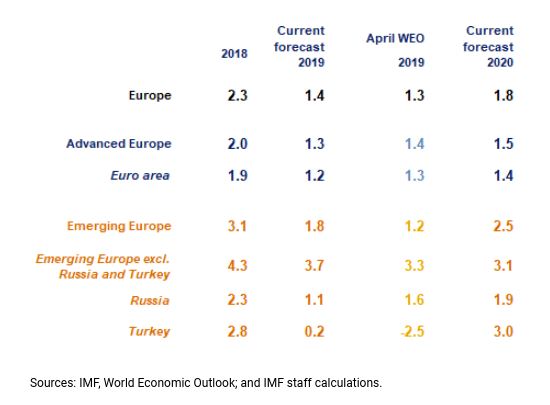the International monetary Fund (IMF), economic growth in Europe will decline from 2.3 per cent in 2018 to 1.4 percent in 2019. For 2020 is expected to be moderate and fragile recovery because of the possible improvement in external demand, which will limit secondary effects arising in investments and services.
At the same time, IMF experts say serious differences between the situation in developed and developing countries of Europe. In the October review of the world economy (World Economic Outlook, WEO) forecast of GDP growth of developed European countries were downgraded by 0.1 percentage points (PP) to 1.4 percent for developing - increased by 0.5 percentage points, to 1.8%.

"In conditions of high uncertainty, balance of risks continues to be inclined downward, and a key risk factor in the short term is a no-Brexit deal, which could have a material adverse impact on the economy of the region. Increased tension in trade and the related uncertainties may have a negative pressure on investment. Moreover, the deterioration in the trade and industrial sector could spread to other sectors, namely services, faster and to a greater extent than assumed in the moment", - said in the review.
Among other potential risks, the IMF experts noted the financial difficulties the possibility of renewed deflationary pressure in the developed countries of Europe, a sharp decline in risk appetite and geopolitical factors.
"Weak inflationary pressures and slowing economic activity in many European countries require maintaining a stimulating monetary policy in Europe", - stated in the review.
the rest of the world, the European trade and production weakened. There are some indications that this slowdown applies to the rest of the economy. While services and consumption remained relatively stable in line with strong labour markets, investments begin to lose their positions.
Structural reforms such as policies to improve competitiveness and labour force participation remains essential to increase productivity and revenues, summarized in the IMF.




